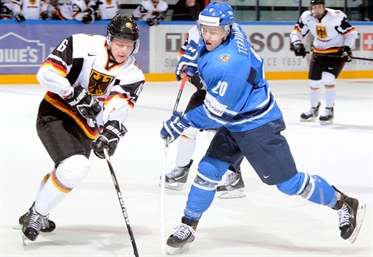Teräväinen needs to stay sharp
Teräväinen needs to stay sharp
Chicago prospect captains Finland in Malmö

 Teuvo Teräväinen learned his lesson from last year and is again expected to be a leader for the Finnish U20 national team. Photo: Richard Wolowicz / HHOF-IIHF Images
Teuvo Teräväinen learned his lesson from last year and is again expected to be a leader for the Finnish U20 national team. Photo: Richard Wolowicz / HHOF-IIHF Images
That’s exactly what it should look like, and what both the team management and Teräväinen want it to look like in Malmö once the World Juniors kick off. Teräväinen was dangerous throughout the game, leading the charge of Finland’s first line – with Saku Mäenalanen och Artturi Lehkonen as his wingers – even if the line was kept of the scoresheet.
Teräväinen, the Chicago Blackhawks first-round draft pick from 2012, is a key player on a team that wants to improve from last year’s tournament when it had to play for its spot in the top division. Teräväinen scored eleven points in last year’s tournament, finishing fourth in tournament scoring, but seven of his points came in the two relegation-round games against Germany and Slovakia, which Finland won 8-0 and 11-4, respectively.
“I’m looking forward to this year’s tournament. I know that I’ll have a big role on the team and that I’ll have to be the one to lead the team and win some games. That’s a great opportunity for me,” Teräväinen told IIHF.com.
“Of course there are always expectations and outside pressure, but I don’t let them get to me. I had expectations of me too, and while the first few months of the [Finnish league] season haven’t been as good as expected as far as points production is concerned, I’m not worried. I feel good, and I think the goals will come,” he added.
Teräväinen’s somewhat disappointing beginning of the season can partly be explained with the fact that his preparation for the season was a little different from past seasons, and busier than before. First there was the traditional under-20 Lake Placid tournament, and just as he got back home from that, he had to get ready to attend the Blackhawks’ training camp. Right after the camp, he then joined his Jokerit Helsinki in the Finnish league. They had already played five regular season games.
Continue reading“The Lake Placid tournament went well. There were many players who are already in the NHL, so it was a good measuring stick for me,” Teräväinen says.
“Attending the Blackhawks camp was also a great experience. It was useful for me to have a glimpse into that world, and to play a couple of exhibition games. Of course the game is much faster and everybody is a lot stronger than the players in Finland, but I thought I did alright. I need to get stronger, but at least I know now that it’s not that far away,” he says.
No, the NHL’s not that far away, and if Teräväinen needs any inspiration, he can look to Olli Määttä, who was still eligible to play in the World Juniors, but instead logs 20 minutes of ice time with the Pittsburgh Penguins in the NHL: Things can change in a hurry.
Teräväinen has taken strides forward every year. In his first season in the Finnish league, he scored eleven goals and 18 points in 40 games. Last year, he scored 13 goals and 31 points in 44 games, and this season, he’s on pace to score 35 points (albeit in 60 games).
But now his focus is on the World Juniors. Finland won gold in 1998, and then won one silver and four bronze medals between 2001 and 2006, but hasn’t been in the top-3 since then. It’s been seven long years, and Teräväinen – whose name is a derivate of “terävä”, or “sharp” in Finnish – is determined to buck the trend.
“In the World Juniors, you have to be able to play well from the first game, because if you’re not ready in the preliminary round, you’ll never get to the playoffs,” he says.
Last year, the Finns lost a crucial preliminary game to the Czechs, and needed at least a point in their final preliminary round game against Sweden. Finland rallied back from a 3-0 deficit to tie the game early in the second period, before being down by two goals again.
But before the Sweden game, the Finnish had a chance to take the important point, had the beat Switzerland in regulation time, instead of shootout like they did. Switzerland won just one game in the preliminary round – Finland beat Latvia and Switzerland – but they also lost all three of their games in OT or regulation, getting enough points to finish third in the group, ahead of Finland.
Teräväinen says he learned a lesson there.
“We have a great team, again, but it’s a short tournament and as we saw last year, anything is possible. We know that we can beat any team,” he says.
Back to Overview































































